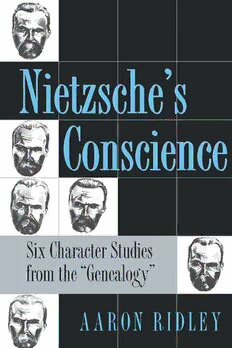
Nietzsche's Conscience: Six Character Studies from the Genealogy PDF
Preview Nietzsche's Conscience: Six Character Studies from the Genealogy
Nietzsche's Conscience ALSO BY AARON RIDLEY Music, Value and the Passions Beginning Bioethics R. G. Collingwood: A Philosophy ofA rt NIETZSCHE'S CONSCIENCE .... ~ Six Character Studies from the Genealogy AARON RIDLEY CORNELL UNIVERSITY PRESS ITHACA AND LONDON Copyright © I998 by Cornell University All rights reserved. Except for brief quotations in a review, this book, or parts thereof, inust not be reproduced in any form without permission in writing from the publisher. For information, address Cornell University Press, Sage House, 5I2 East State Street, Ithaca, New York I485o. First published I998 by Cornell University Press First printing, Cornell Paperbacks, I998 Printed in the United States of America LIBRARY OF CONGRESS CATALOGING-IN-PUBLICATION DATA Ridley, Aaron. Nietzsche's conscience : six character studies from the Genealogy I Aaron Ridley. p. em. Includes bibliographical references and index. ISBN o-8or4-3557-9 (cloth : alk. paper} ISBN 0-80I4-8553-3 (pbk.) r. Nietzsche, Friedrich Wilhelm, I844-I900. Zur Genealogie der Moral. 2. Ethics. I. Title. B33I3.Z73R53 I998 I70-dc2I Cornell University Press strives to use environmentally responsible suppliers and materials to the fullest extent possible in the publishing of its books. Such materials include vegetable-based, low-VOC inks and acid-free papers that are recycled, totally chlorine-free, or partly composed of nonwood fibers. Cloth printing ro 9 Paperback printing ro 9 8 7 6 5 4 3 2 I To Ann CoNTENTs Preface Vlll Note on Sources Xl Introduction I Chapter One The Slave 15 Chapter Two The Priest 41 Chapter Three The Philosopher 64 Chapter Four The Artist 78 Chapter Five The Scientist 96 Chapter Six The Noble 127 Conclusion 157 Index r6r PREFACE I had been fascinated by Nietzsche for a long time before daring to write about him. But when I arrived in Southampton in 1994 and found myself at last able to offer a course on him, my inhibitions began to falter-even if the course was given in the event with more trepidation than competence. And then the politics department hired David Owen, whose book Nietzsche, Poli tics and Modernity I read with a dawning sense of how a decent course on Nietzsche might actually have been put together. We started to talk, and it was David's encouragement that finally got me to put pen to paper. Since then we have thrashed through every word I've written on Nietzsche, many of those words being themselves the products of earlier thrashings through. I haven't made any attempt in what follows to flag the things I owe to him; to have done so, apart from being tedious and embarrassing, would also have been impossible. There is an art of virtual coauthorship, and David mastered it here. l must also thank the proprietors and staff of the Avenue Bar, Pad well Road, for providing the environment in which almost all of our discus sions took place, as well as the vast majority of the actual writing, editing, and revising. But then I've been fortunate across the board. The editors of the journal of Nietzsche Studies and of Nietzsche, Philosophy and the Arts (Cambridge University Press, 1998) have kindly allowed me to reuse parts of two previ ously published essays in Chapters 1 and 4· My father, Brian Ridley, read an early version of the complete manuscript and persuaded me to take out some awful bits and to clarify some others. Henry Staten, who read the book for Cornell at the behest of the excellent Roger Haydon, understood what I was up to so much better than I did that his comments struck often with the force of revelation. To the extent that I have managed to incorporate or act upon his suggestions, the book is a great deal more convincing now than it was.
